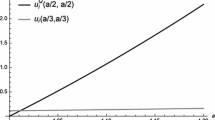Abstract
The aim of the paper is to study the Bertrand duopoly example in the quantum domain. We use two ways to write the game in terms of quantum theory. The first one adapts the Li–Du–Massar scheme for the Cournot duopoly. The second one is a simplified model that exploits a two qubit entangled state. In both cases, we focus on finding Nash equilibria in the resulting games. Our analysis allows us to take another look at the classic model of Bertrand.


Similar content being viewed by others
Notes
We should stress here that quantum games are games in the standard sense and the reader should not assign any mysterious contexts to the adjective quantum.
References
Meyer, D.A.: Quantum strategies. Phys. Rev. Lett. 82, 1052–1055 (1999)
Eisert, J., Wilkens, M., Lewenstein, M.: Quantum games and quantum strategies. Phys. Rev. Lett. 83, 3077 (1999)
Marinatto, L., Weber, T.: A quantum approach to static games of complete information. Phys. Lett. A 272, 291 (2000)
Baaquie, B.E.: Interest Rates and Coupon Bonds in Quantum Finance. Cambridge University Press, Cambridge (2010)
Khrennikov, A.: Ubiquitous Quantum Structure. Springer, Berlin (2010)
Busemeyer, J.R., Bruza, P.D.: Quantum Models of Cognition and Decision. Cambridge University Press, Cambridge (2012)
Haven, E., Khrennikov, A.: Quantum Social Science. Cambridge University Press, Cambridge (2013)
Baaquie, B.E.: Quantum Finance: Path Integrals and Hamiltonians for Options and Interest Rates. Cambridge University Press, Cambridge (2004)
Fra̧ckiewicz, P.: Application of the Eisert–Wilkens–Lewenstein quantum game scheme to decision problems with imperfect recall. J. Phys. A Math. Theor. 44, 325304 (2011)
Piotrowski, E.W., Sładkowski, J.: Trading by quantum rules—quantum anthropic principle. Int. J. Theor. Phys. 42, 1101 (2003)
Piotrowski, E.W., Sładkowski, J.: Quantum games in finance. Quant. Finance 4, C61 (2004)
Piotrowski, E.W., Sładkowski, J.: Quantum diffusion of prices and profits. Phys. A 345, 185 (2005)
Piotrowski, E.W., Sładkowski, J.: Quantum English auctions. Phys. A 318, 505 (2003)
Piotrowski, E.W., Sładkowski, J.: Quantum auctions: facts and myths. Phys. A 387, 3949 (2008)
Sładkowski, J.: Giffen paradoxes in quantum market games. Phys. A 324, 234 (2003)
Aerts, D.: Quantum structure in cognition. J. Math. Psychol. 53, 314 (2009)
Yukalov, Y.I., Sornette, D.: Quantum probability and quantum decision making. Philos. Trans. R. Soc. A 374, 20150100 (2016)
Makowski, M., Piotrowski, E.W., Sładkowski, J.: Do transitive preferences always result in indifferent divisions? Entropy 17, 968 (2015)
Puu, T.: Oligopoly: Old Ends-New Means. Springer, Berlin (2011)
Li, H., Du, J., Massar, S.: Continuous-variable quantum games. Phys. Lett. A 306, 73 (2002)
Chen, X., Qin, G., Zhou, X., Du, J.: Quantum games of continuous distributed incomplete information. Chin. Phys. Lett. 22, 1033 (2005)
Li, Y., Qin, G., Zhou, X., Du, J.: The application of asymmetric entangled states in quantum games. Phys. Lett. A 335, 447 (2006)
Sekiguchi, Y., Sakahara, K., Sato, T.: Uniqueness of Nash equilibria in a quantum Cournot duopoly game. J. Phys. A Math. Theor. 43, 145303 (2010)
Wang, X., Yang, X., Miao, L., Zhou, X., Hu, C.: Quantum Stackelberg duopoly of continuous distributed asymmetric information. Chin. Phys. Lett. 24, 3040 (2007)
Yu, R., Xiao, R.: Quantum Stackelberg duopoly with isoelastic demand function. J. Comput. Inf. Syst. 8, 3643 (2012)
Wang, X., Hu, C.: Quantum Stackelberg duopoly with continuous distributed incomplete information. Chin. Phys. Lett. 29, 120303 (2012)
Lo, C.F., Kiang, D.: Quantum Bertrand duopoly with differentiated products. Phys. Lett. A 321, 94 (2004)
Qin, G., Chen, X., Sun, M., Du, J.: Quantum Bertrand duopoly of incomplete information. J. Phys. A Math. Gen. 38, 4247 (2005)
Bertrand, J.: Théorie mathématique de la richesse sociale. Journal des Savants 67, 499 (1883)
Cournot, A.: Recherches sur les Principes Mathématiques de la Théorie des Richesses. Hachette, Paris (1838)
Peters, H.: Game Theory: A Multi-Leveled Approach. Springer, Berlin (2008)
Fra̧ckiewicz, P.: Remarks on quantum duopoly schemes. Quantum Inf. Process. 15, 121 (2015)
Iqbal, A., Toor, A.H.: Backwards-induction outcome in a quantum game. Phys. Rev. A 65, 052328 (2002)
Merzbacher, E.: Quantum Mechanics, 3rd edn. Wiley, Hoboken (1998)
Sekiquchi, Y., Sakahara, K., Sato, T.: Existence of equilibria in quantum Bertrand–Edgeworth duopoly game. Quantum Inf. Process. 11, 1371 (2012)
Acknowledgments
We would like to thank the Reviewers for discussion which undoubtedly improved the quality of our work. Work by Piotr Fra̧ckiewicz was supported by the Ministry of Science and Higher Education under the project Iuventus Plus IP2014 010973.
Author information
Authors and Affiliations
Corresponding author
Additional information
This work was supported by the Ministry of Science and Higher Education in Poland under the project Iuventus Plus IP2014 010973 in the years 2015–2017.
Rights and permissions
About this article
Cite this article
Fra̧ckiewicz, P., Sładkowski, J. Quantum approach to Bertrand duopoly. Quantum Inf Process 15, 3637–3650 (2016). https://doi.org/10.1007/s11128-016-1355-3
Received:
Accepted:
Published:
Issue Date:
DOI: https://doi.org/10.1007/s11128-016-1355-3




